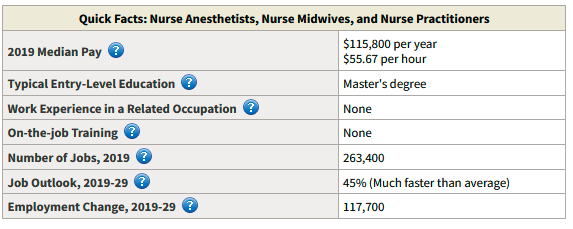Top 7 Fastest Growing Specializations in Nursing
While it’s true that job demand across various industries tends to fluctuate depending on the state of the economy, healthcare careers are thriving. In fact, according to the Bureau of Labor Statistics (BLS), the healthcare industry is expected to add over 6 million jobs through 2029. Healthcare jobs are expected to have more openings than any other occupational group, driven by an aging population that will ultimately demand reliable healthcare services.
While the healthcare industry may have a wide variety of job opportunities, some are poised for exceptional growth, such as nursing. Within the nursing sector, there are even more specializations that are going to be considered some of the fastest growing jobs in healthcare. Take note of the following:
1. Nurse Practitioners
Nurse practitioners are essentially registered and licensed nurses that pursued additional schooling to take on more responsibilities in the workplace. This can include taking patient histories, ordering patient labs and analyzing the results, performing physical exams, prescribing medicines, authorizing treatments, and educating as well as coordinating with patients and their families for continued care.
Given the intensive training and education required to become a nurse practitioner, this particular specialization happens to be one of the most lucrative jobs in healthcare, often commanding six-figure salaries. More importantly, the growth of nurse practitioners is exceptional, with BLS predicting a 45% growth through 2029.

2. Registered Nurses
Registered nurses typically have a couple of options to complete their training—pursuing a bachelor’s degree in nursing or completing an associate’s degree in nursing being the most common. Training to be a registered nurse can be demanding and rigorous, especially since they’re tasked with providing and coordinating patient care. On the other hand, it’s also considered one of the most rewarding jobs in healthcare.
The BLS predicts a 7% growth for registered nurses through 2029, with over 200,000 jobs opening up—which is faster than the average for all other occupations. This is due to an aging Baby Boomer population who will need more focused and reliable healthcare to manage chronic conditions.
3. Nurse Midwife
Nurse midwives are APRNs (Advanced Practice Registered Nurses) with a job description that’s similar to obstetricians or gynecologists. Essentially, they are registered nurses with advanced education in midwifery. This allows them to handle normal pregnancies, whereas gynecologists and obstetricians are the only ones who can perform c-sections or other cases that may require surgeries.
With more women opting for drug and intervention-free childbirth and requiring more one on one time with a trusted healthcare provider, the demand for more nurse midwives is also increasing. According to the BLS, the field is expected to see a 15.7% rise in employment growth.
4. Nurse Anesthetist
Nurse anesthetists are registered nurses specializing in anesthesiology. Their education is complemented with critical care experience (minimum 1 year) and completing a master’s degree. While the educational requirements of nurse anesthetists are more demanding, their compensation and job outlook is also higher. This area of nursing specialization is considered one of the highest paid in healthcare, commanding six-figure salaries on average. It’s also included (along with nurse midwives and nurse practitioners) as one of the fastest growing, with a job outlook projected at 45% growth between 2019-2029.
5. Cardiac Nurse
The demand for cardiac nurses has started to grow in recent years given the increasing number of people suffering from heart-related issues. Cardiac nurses require an associate’s degree or bachelor’s degree and have a license requirement. Their job includes providing specialized nursing care for cardiovascular related diseases as well as clinical procedures such as bypass, angioplasty, or pacemaker surgery.
The specialization is expected to see a 26% increase through 2028, with an annual average salary of over $60,000.
6. Clinical Nurse Specialist (CNS)
Clinical Nurse Specialists fall under the category of APRNs. They are responsible for delivering direct patient care by coordinating closely with other nurses and healthcare staff with the intent of improving the quality of care that patients receive. Often, CNSs serve in administrative leadership roles that allow them to mentor, educate, and advise other nursing staff.
The BLS expects a 19% rise in jobs for CNSs, once again driven by aging Baby Boomers who will require more specialized care and management for their chronic illnesses.
7. Critical Care Nurse
Critical Care Nurses serve similar roles as Registered Nurses with one key difference—they are specifically trained to work in emergencies. The specialization is fast-paced, demanding, and can be stressful. Critical care nurses often deal with serious wounds and monitor life support systems in life or death situations.
Even so, the pace and challenges of being a critical care nurse is a big draw for aspiring healthcare professionals who understand the impact they can make in the lives of those who they help assist in major traumatic events. The field is expected to see a 19% increase in job growth.
Understanding what nursing fields are lucrative and poised for growth is a good place to start in determining which nursing specialty is right for you. If you would like to know more, visit our website to get started in the nursing industry.














